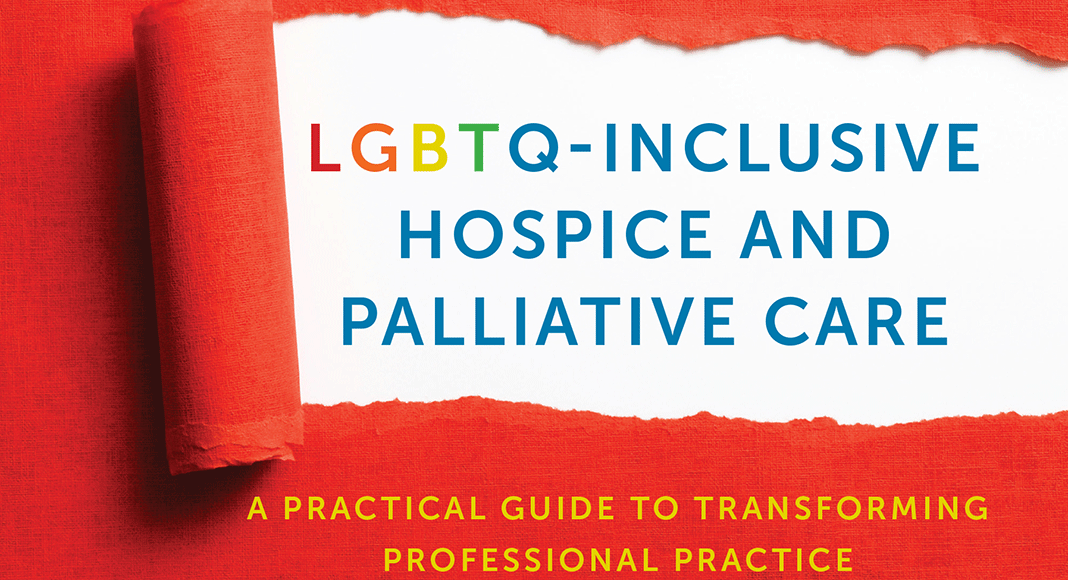
Groundbreaking LGBTQ Hospice Care Handbook the First of Its Kind
November is National Hospice and Palliative Care Month and LGBTQ* scholarly publisher Harrington Park Press is reaching out to make hospice and palliative care providers aware of an important new book, “LGBTQ-Inclusive Hospice And Palliative Care: A Practical Guide To Transforming Professional Practice”.
Written by Kimberly D. Acquaviva, a tenured faculty member at the George Washington University School of Nursing, it is the first of its kind and the only handbook for hospice and palliative care professionals looking to enhance their care delivery or their programs with LGBTQ-inclusive care.
Anchored in the evidence, extensively referenced, and written in clear, easy-to-understand language, “LGBTQ-Inclusive Hospice and Palliative Care” provides clear, actionable strategies for hospice and palliative physicians, nurses, social workers, counsellors, and chaplains.
Though written specifically as a guide for any hospice/palliative care facility and its caregivers, the book contains advice that is clearly applicable across the spectrum of personal care organizations, nurses, doctors, counsellors, and home health aids.
Beyond sensitivity training to LGBTQ patients, “LGBTQ-Inclusive Hospice and Palliative Care” reiterates the broader tenet of never assuming anything about the patients, family members or even your own employees: Never assume the gender and how the person wishes to be addressed, never assume that their family either rejects or embraces them because of how they identify or live and never assume anything regarding spirituality.
In addition to fundamentals from how to conduct an inclusive “intake interview” to understanding complex family dynamics and spiritual care, the book offers clear-eyed guidance on topics that may not be as obvious, but equally critical, such as whether or not an LGBTQ caregiver should disclose his or her sexuality in an effort to bond with the patient, being mindful to not inadvertently “out” patients whose sex anatomy and gender identity do not match by using their preferred gender pronouns, and making sure patients’ wishes are legally protected with a healthcare power of attorney. (An expanded list is at the bottom of this press release.)
From the book’s chapter advising institutions and programs on how to reach LGBTQ individuals it is clear that for individuals and families searching for a hospice or palliative care organisation that will be sensitive and respectful of their own, a loved one’s or a family member’s LGBTQ identity, the most important thing to look for is a highly visible nondiscrimination statement. This statement should appear on the organisation’s website homepage (not buried on some other page), included in any printed marketing materials, and easy to Google by entering the name of the organisation and the word “discrimination.”
Further indications that an organisation welcomes LGBTQ patients are ads in LGBTQ newspapers and websites, an information booth at a local Pride festival, and availability of an LGBTQ bereavement group. And, of course, though harder to discern, if the organisation has any gay, lesbian, bisexual, or transgender employees in management or leadership positions.
“LGBTQ-Inclusive Hospice And Palliative Care” is a quick read, easy reference and should be required reading for any hospice/palliative care organisation, from top executives to maintenance crews.
“LGBTQ-Inclusive Hospice And Palliative Care” is published by Harrington Park Press, a specialised academic/scholarly book publisher devoted to emerging topics in LGBTQ diversity, equality, and inclusivity and distributed by Columbia University Press.
For more information and please visit www.harringtonparkpress.com.
*Lesbian, Gay, Bisexual, Transgender, Queer
